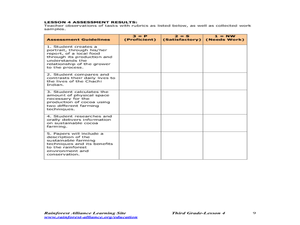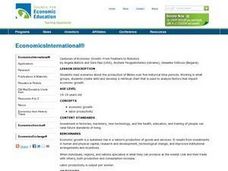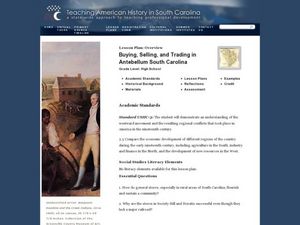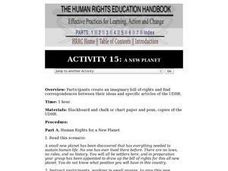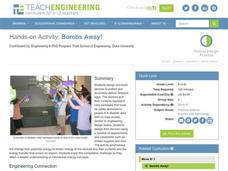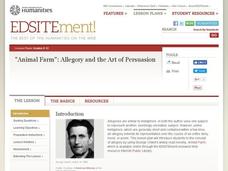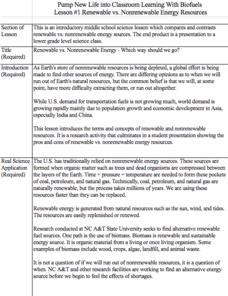Curated OER
Wedge Game
Students explore the Carbon Mitigation Initiative by playing the Wedge Game. In this environmental science instructional activity, students discuss different strategies to reduce carbon emissions. They evaluate their strategies and rate...
Curated OER
Equadorian Rainforest: The Tropical Supermarket
Students study the concept of sustainable agricultural practices through cocoa farming and the lives of the people who are the producers. Students watch a slide show and read a story which helps them understand the origins of chocolate,...
Curated OER
Centuries of Economic Growth: From Feathers to Robotics
Students read scenarios about the production of Bibles over five historical time periods. Working in small groups, students create skits and develop a retrieval chart that is used to analyze factors that impact economic growth.
Curated OER
SAVE OUR EARTH
Students research current environmental problems in order to develop and deliver an oral presentation. The presentation persuades the audience to act on the student's point of view on the issue.
Curated OER
Wilderness Survival: A Field Practicum
Students are provided with hands-on-field testing of authentic applications from principles pertaining to: Psychology A. Develop a positive, can-do attitude with a high degree of self-reliance that is transferable to human interactions...
Curated OER
Wilderness Survival: A Field Practicum
High schoolers use hands-on field-testing of authentic application from principles pertaining to: Psychology- A. Develop a positive, can-do attitude with a high degree of self-reliance that is transferable to human interactions outside...
Curated OER
Mountain Pine Beetles
Students research and develop power point presentations that answer the question, "What is changing our forests?" In this ecology lesson, students research the niche of Pine Beetles and their increased effect on the forests in...
Curated OER
Buying, Selling, and Trading in Antebellum South Carolina
Students research the role of general stores in the development of communities. In this South Carolina history lesson, students study the economic development of early U.S. communities. Students write essays and create advertisements...
Curated OER
Human Rights Education Handbook: A New Planet
Young scholars create an imaginary bill of rights and find correspondences between their ideas and specific articles of the Universal Declaration of Human Rights.
Curated OER
How can we write a silly story?
Second graders use the writing process and create a silly story. In this silly story lesson, 2nd graders will review person, event and setting and complete a chart for each. Students will put a person, event and setting...
Curated OER
The Drake Equation
Learners use the Drake Equation to calculate the probability of sustaining life on various planets. Through the use of the equation, they determine whether intelligent and advanced civilizations can be developed on planets other than...
Curated OER
Reduce Reuse Recycle
Learners discover methods that can save the planet by recycling. In this sustainable planet lesson, students read The Berenstein Bears Don't Pollute Anymore, and practice memorizing the 3 R's. Learners write commitment...
Curated OER
Building an Underwater Habitat
Students investigate underwater habitats. In this underwater habitat lesson, students study Aquarius and design their own underwater habitat that can sustain life. Students work in groups and present their habitats to the class. Students...
Curated OER
In the Public's Eyes
Learners examine the views of Serb and American civilians on the sustained NATO air strikes on Serbia and focus on how public opinion affects and reflects the overall morale and attitudes in a country.
Curated OER
Global Resources: What Will You Do with Your Power?
Students examine the human impact on natural resources. They read and discuss an article, evaluate nations regarding their environmental problem-solving, develop a presidential speech on the environment, and conduct a natural resources...
Curated OER
Bombs Away!
Students design and build a device to protect and accurately deliver a dropped egg. They review and study a number of vocabulary words that are associated with this lesson. They work in a small group in order to develop a successful...
Curated OER
Write Me a Story
Second graders use the writing process and submit a story to www.kids.com. In this story writing lesson, 2nd graders choose a topic for a story contest. Students develop their stories. Students complete a her...
Curated OER
Watch Me Grow
Students observe that plants need air, food, light, and water to survive. In this plant biology instructional activity, students observe the growth and development of two plants, one is the control plant and the other is denied...
Curated OER
Entering the Twilight Zone
Students describe major features of cold-seep communities and the process of chemosynthesis as it relates to organisms in each habitat. In this deep-sea habitats lesson, students study the categorization of ocean habitats...
New York City Department of Education
Grade 5 Literacy in English Language Arts: Should the School Day Be Longer?
Scholars read newspaper articles relating to a longer school day and complete note-taking organizers as they read. They then form opinions and complete outlines before writing essays supporting their point of view.
Council for Economic Education
Federal Budget Lesson Plan and Fiscal Ship Student Game
The federal budget has never been so fun! Using an interactive game, high schoolers choose from a variety of policy options after identifying goals and try to balance these changes in policy with a federal budget.
National Endowment for the Humanities
Animal Farm: Allegory and the Art of Persuasion
Introduce your class members to allegory and propaganda with a series of activities designed to accompany a study of George Orwell's Animal Farm. Readers examine the text as an allegory, consider the parallels to collective farms...
National Wildlife Federation
Lights, Camera, Action! Conducting an Energy Audit
Thirty percent of energy used by schools is used inefficiently! Part two in the series of 12 has groups perform energy audits of their schools as part of the Cool Schools Challenge. Each group is assigned a specific room, performs the...
Kenan Fellows
Renewable vs. Nonrenewable Energy Resources
Is one type of energy inherently good or bad? Young scientists explore energy resources in a week-long unit. After extensive research, groups create powerful position statements and presentations supporting their energy resource of choice.

